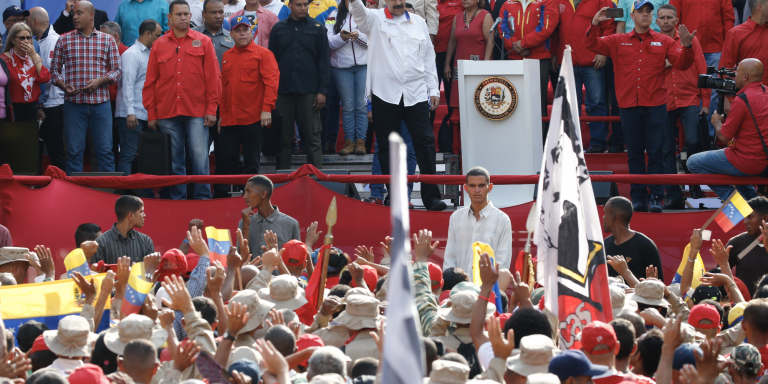INTELBRIEF
June 25, 2019
IntelBrief: Waning Interest in Venezuela?

- As it becomes more evident that Venezuelan strongman Nicolas Maduro will remain in power, the Trump administration seems to have cooled on the idea of regime change in Venezuela.
- Given Russia’s intervention to bolster Maduro, and increasing tensions with Iran in the Persian Gulf occupying its time, the administration seems unable to lay out a coherent strategy for achieving its objectives in Venezuela.
- Crippling sanctions have targeted Venezuela’s economy in the hope that the situation will become so untenable for Maduro that he will feel compelled to negotiate his exit.
- Despite the country’s slow-motion collapse, the Maduro regime has clung to power, supported by a small cadre of so-called revisionist states, including Russia, Cuba, and Iran.
.
.As it becomes increasingly evident that Venezuelan strongman Nicolas Maduro will remain in power, despite destabilizing protests and demonstrations that have rocked the country for months, the Trump administration seems to have given up on the idea of regime change in Venezuela. Belatedly recognizing that ousting Maduro will not be easy, especially given Russia’s intervention to bolster the regime, coupled with increasing tensions between Washington and Tehran in the Persian Gulf, the administration seems unable to focus on Venezuela and lay out a coherent strategy to achieve its objectives, which are unclear at this juncture.
In late April, high-ranking military officers close to Maduro failed to follow through on an alleged promise to join the opposition, led by Juan Guaido. The U.S. voiced its support for Guaido back in January, when he declared himself interim president, a move that garnered support from a significant portion of the international community who viewed Maduro’s rule as illegitimate. At one point, President Trump declared that 'all options,' including military force, were on the table when dealing with the Maduro regime. But more recently, Trump seems to have deemphasized Venezuela as a priority, rarely mentioning Maduro or Venezuela in his public remarks or on social media. At the same time, National Security Adviser John Bolton regularly references Venezuela, reiterating stern warnings and thinly veiled threats.
Crippling sanctions have targeted Venezuela’s economy in the hope that the situation will become so untenable for Maduro that he will feel compelled to negotiate his exit, handing over power to a new government led by Guaido and supported by the U.S. and its allies. Oil exports have fallen by half, leading to a devastating economic collapse. Meanwhile, the country continues a downward spiral of misery and despair, with vast movements of internally displaced persons, widespread hunger and poverty, and shortages of critical supplies, including medicine. One million refugees have fled the country in the past seven months, destabilizing other countries in the region lacking the resources and political will to cope with the mounting humanitarian disaster. Armed rebel groups from neighboring Colombia have taken control of vast swaths of Venezuelan territory. Despite the country's slow-motion collapse, the Maduro regime has clung to power, supported by a small cadre of so-called revisionist states, including Russia, Cuba, and Iran.
The situation in Venezuela will get worse before it gets better. And the Trump administration is still struggling to formulate a foreign policy approach. The threat of military force may sound like tough talk but is widely considered counterproductive. Sanctions levied on Venezuela’s oil industry have pushed Maduro closer to Putin, in a bid to buoy the country’s energy sector. Guaido has failed in all three of his attempts to dislodge Maduro and the senior officials close to Maduro that many assumed would turn on him, have doubled down, signaling that they are willing to close ranks and support Venezuela’s embattled leader. Without clearly articulated objectives and a coherent strategy to achieve them, Washington will continue to remain sidelined in Venezuela while Putin’s support for yet another dictator gives Moscow another foreign policy victory while U.S. influence is blunted in Latin America.
.
For tailored research and analysis, please contact: info@thesoufancenter.org
[video width="960" height="540" mp4="https://thesoufancenter.org/wp-content/uploads/2019/06/IB-0625-1.mp4" poster="https://thesoufancenter.org/wp-content/uploads/2019/06/Venezuelas-President-Nicolas-Maduro-e1561384594806.png"][/video]